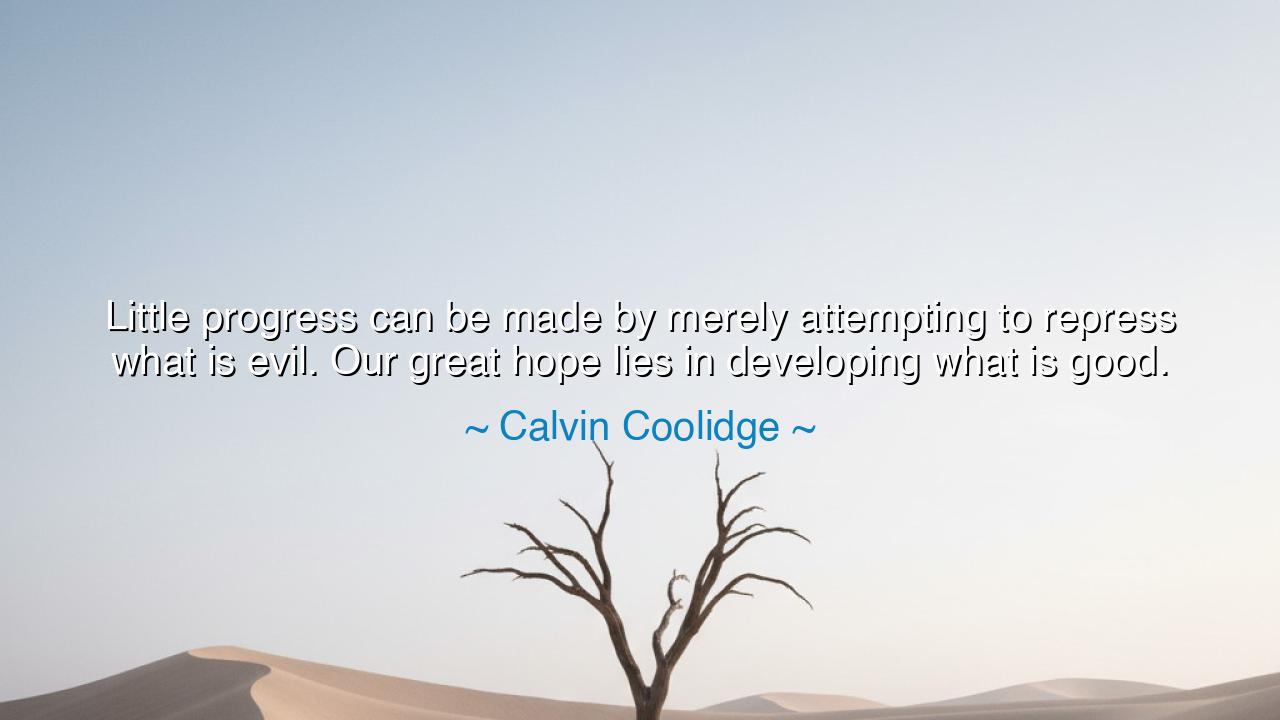
Little progress can be made by merely attempting to repress what
Little progress can be made by merely attempting to repress what is evil. Our great hope lies in developing what is good.






“Little progress can be made by merely attempting to repress what is evil. Our great hope lies in developing what is good.” Thus spoke Calvin Coolidge, the quiet philosopher-president of the United States, whose restraint concealed a deep and steady wisdom. In these words, he reveals an ancient truth — that the world is not healed through punishment alone, but through cultivation, that darkness is not banished by striking at it endlessly, but by kindling light. Coolidge, often remembered for his calm demeanor and belief in moral discipline, knew that progress — in nations or in souls — is born not from negation, but from creation. Evil, he teaches, cannot be conquered by rage; it must be replaced by goodness grown stronger than its shadow.
This wisdom is as old as the dawn of civilization. The philosophers of Greece understood it: Socrates taught that ignorance, not malice, is the root of wrongdoing, and that education, not suppression, is the path to virtue. The sages of the East echoed the same truth — Lao Tzu said, “If you remove evil without cultivating good, it will return, for emptiness invites what once was.” Coolidge, though a man of the modern world, spoke from that same eternal well. He saw that in politics, in morals, and in human life, obsession with the destruction of evil often blinds us to the task of building good. The mind that only resists corruption never creates beauty. The nation that only punishes vice never nourishes virtue.
In his time, Coolidge led a country emerging from the turmoil of war, division, and moral exhaustion. The world had seen evil in many forms — the brutality of battle, the greed of industry, the decay of trust. Many demanded revenge, control, or suppression of all that was corrupt. But Coolidge, in his quiet way, urged a higher path. He believed that a republic’s strength came not from fear or enforcement, but from character — from citizens who built their lives upon honesty, diligence, and faith. He understood that evil withers not by being beaten down, but by being outgrown — by a people so devoted to virtue that vice loses its appeal. His words were a call not to rage, but to renewal.
To understand this truth more deeply, look to the story of Nelson Mandela, who, generations later, would embody it in action. When freed after twenty-seven years of imprisonment, he could have sought vengeance upon his oppressors; instead, he chose reconciliation. He did not focus on repressing the evil that had ruled South Africa but on developing the good — on unity, forgiveness, and moral rebuilding. Through this, he transformed a nation. Mandela’s victory was not merely political; it was spiritual. He proved that the way to defeat hatred is not to mirror it, but to rise above it — to replace the hunger for destruction with the work of creation.
The ancients would have called this the law of virtue and harmony. The Stoics taught that to be good is not merely to avoid wrongdoing, but to become an instrument of order and love in the world. “Do not curse the darkness,” they said, “light a lamp.” And this is precisely what Coolidge meant: that repression alone — whether of thoughts, instincts, or evils in society — leads only to stagnation. To destroy the weed without planting the seed leaves the field barren, and soon the weed returns. Only by nurturing the good — through education, compassion, and moral example — can we truly transform the world and ourselves.
Too often, humanity repeats the same error. We condemn what is wrong but fail to create what is right. We silence the voice of cruelty but do not teach the language of kindness. We strike down injustice but forget to plant the roots of equity. Coolidge’s words remind us that progress is not the absence of evil, but the presence of good — not the empty quiet of repression, but the living symphony of moral growth. Just as a physician heals not by fighting disease alone but by strengthening the body, so must we heal the soul of society by nourishing what is life-giving, not merely resisting what is harmful.
So, my friend, let this be your lesson: when you see evil in the world, do not only resist it — replace it. When you encounter anger, bring peace; when you witness greed, practice generosity; when you see ignorance, teach truth. Build what is good so firmly, so beautifully, that there is no space left for the bad to return. Evil cannot thrive where goodness grows, just as night cannot endure where the sun rises.
For as Calvin Coolidge teaches, our destiny does not lie in endless battle with the shadows — it lies in tending the light. Repression may restrain, but only creation redeems. The truest progress of a soul, a nation, or an age comes not from what it destroys, but from what it cultivates. Therefore, plant goodness wherever you walk, nurture virtue in all you do, and let your life itself become the answer to the evils of the world.






AAdministratorAdministrator
Welcome, honored guests. Please leave a comment, we will respond soon